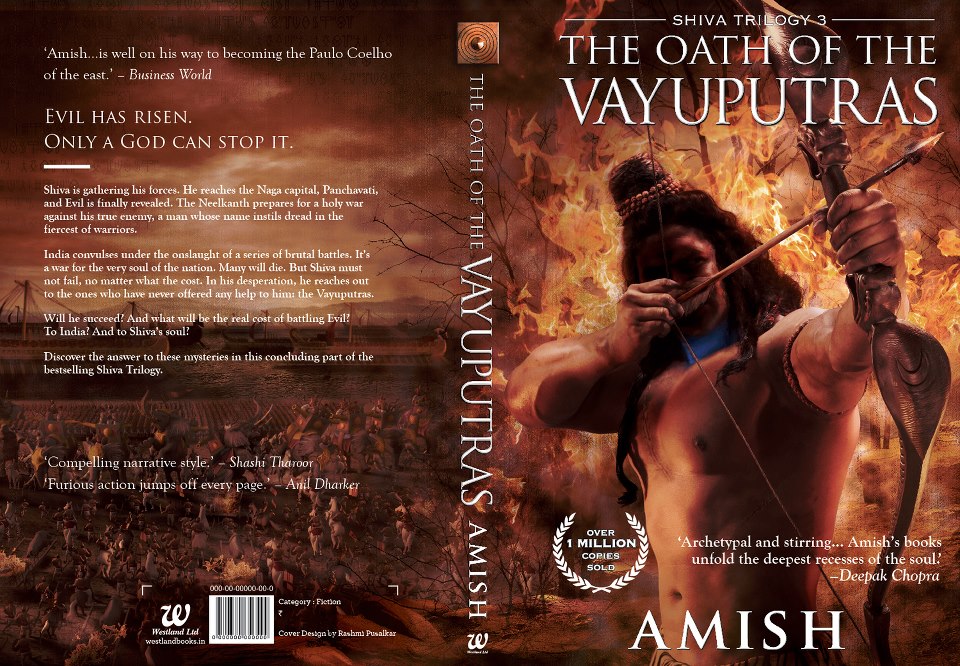Author: Amish Tripathi
Rating: 3.5/5
The Indian literature orbiting the mythological milieu surely got a fresh kick of awesome when Amish stripped down the Gods to man-level humbleness, glorifying their deeds over their rumored persona and presenting their rawest of forms before the readers to empathize with. The Oath of the Vayuputras is a befitting end to The Shiva Trilogy, one where the Evil is discovered and filtered off the system, paving way for the greater good, and depicting the bigger metaphysical picture that life holds for us.

History will be deeply obliged to Amish for a long time to come, for lacing up this fictional adaptation with so many thrills that one can’t help losing oneself in the life of Shiva. The third installment in the Shiva Trilogy series is also the most emotionally charged, and the Lament of the Neelkanth is one such chapter that’ll have you teary-eyed for sure. The book has a rich narrative that at a point tends to go against it, but the parts describing the Vayuputras’ abode and Sati’s fight with the Egyptian assassins have been exceptionally writ. Also, this book fuses deep maturity into Kartik, showing him as a fearsome yet responsible lad who can hold himself even in pressure-cooker situations. The righteous Parvateshwar comes off as “the rare man who speaks exactly what he thinks,” ready to lay down his life for Meluha, while fighting against his living god- the great Neelkanth. The most remarkable character in this book is definitely Sati, with all dimensions of her character- of a wife, a mother and a warrior- beautifully inked!
Half of the book concerns with the validation of Evil and the strategy that’s made for uprooting the same, while a major portion will render insights on the art of warfare- where they’re shown to be technologically far more superior than we are at present, and the Brahmastra and Pashupatiastra are epitomes to this statement. As the author himself mentions in the book, the knowledge passed on to descendants got so diluted that one at present just can’t accept this high a skill to be present during that time, and thus have mistaken them for miracles.
While most of the book had me hooked, I was rather disappointed in the way it concluded. But maybe that’s how it was supposed to infer. Everyone loses something in the end, right? We’ll just sink in the glory of somewhere being a part of this book and making light of what shone best in the series.
And for all those who loved this series, Amish packs in a faint smile by hinting that the Mahabharata may be his next gamble. We sincerely await the same.
Overall Rating (Complete Shiva Trilogy): 4/5
Order your copy of “The Oath Of The Vayuputras” here.
Order the complete Shiva Trilogy here.
The Indian literature orbiting the mythological milieu surely got a fresh kick of awesome when Amish stripped down the Gods to man-level humbleness, glorifying their deeds over their rumored persona and presenting their rawest of forms before the readers to empathize with. The Oath of the Vayuputras is a befitting end to The Shiva Trilogy, one where the Evil is discovered and filtered off the system, paving way for the greater good, and depicting the bigger metaphysical picture that life holds for us.
History will be deeply obliged to Amish for a long time to come, for lacing up this fictional adaptation with so many thrills that one can’t help losing oneself in the life of Shiva. The third installment in the Shiva Trilogy series is also the most emotionally charged, and the Lament of the Neelkanth is one such chapter that’ll have you teary-eyed for sure. The book has a rich narrative that at a point tends to go against it, but the parts describing the Vayuputras’ abode and Sati’s fight with the Egyptian assassins have been exceptionally writ. Also, this book fuses deep maturity into Kartik, showing him as a fearsome yet responsible lad who can hold himself even in pressure-cooker situations. The righteous Parvateshwar comes off as “the rare man who speaks exactly what he thinks,” ready to lay down his life for Meluha, while fighting against his living god- the great Neelkanth. The most remarkable character in this book is definitely Sati, with all dimensions of her character- of a wife, a mother and a warrior- beautifully inked!
Half of the book concerns with the validation of Evil and the strategy that’s made for uprooting the same, while a major portion will render insights on the art of warfare- where they’re shown to be technologically far more superior than we are at present, and the Brahmastra and Pashupatiastra are epitomes to this statement. As the author himself mentions in the book, the knowledge passed on to descendants got so diluted that one at present just can’t accept this high a skill to be present during that time, and thus have mistaken them for miracles.
While most of the book had me hooked, I was rather disappointed in the way it concluded. But maybe that’s how it was supposed to infer. Everyone loses something in the end, right? We’ll just sink in the glory of somewhere being a part of this book and making light of what shone best in the series.
And for all those who loved this series, Amish packs in a faint smile by hinting that the Mahabharata may be his next gamble. We sincerely await the same.
Overall Rating (Complete Shiva Trilogy): 4/5
Order your copy of “The Oath Of The Vayuputras” here.
Order the complete Shiva Trilogy here.